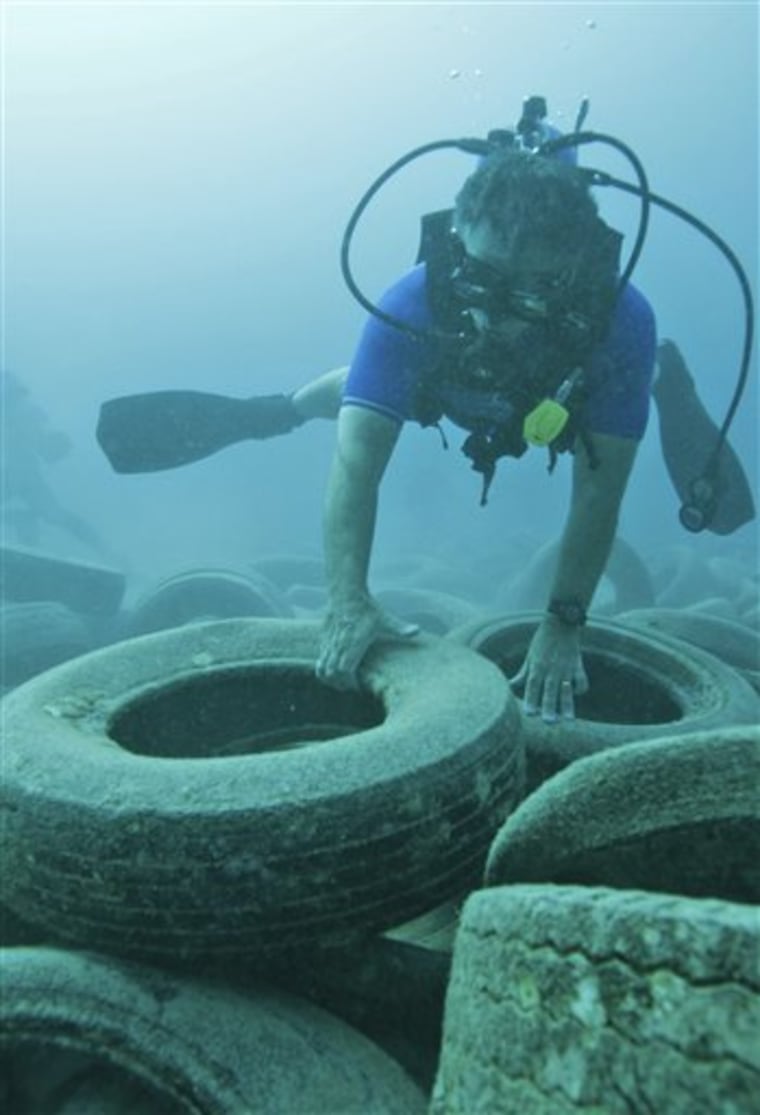With the job undone, U.S. military divers won't return this summer to Florida to clean up a failed artificial reef made of thousands of old tires.
The Army and Navy crews are just stretched too thin by conflicts in Iraq and Afghanistan, the war on terror and earthquake relief in Haiti, a Pentagon official said this week.
About 700,000 tires, some bundled with nylon and steel, were sunk in 1972 a mile off Fort Lauderdale in about 70 feet of water with the good intention of creating an artificial reef.
But it became an ecological blunder: Little sea life formed on them and many tires came loose and scoured a patch of the ocean floor the size of 31 football fields. Thousands have wedged up against the nearby natural reef, stacked several feet high, blocking coral growth and devastating marine life.
Divers from the Army and Navy began cleaning up the mess in 2007, using the project for training at no cost to the state of Florida. But with just about 10 percent of the tires removed, they're not returning likely for at least two years.
"Unfortunately, they're not having a lot of time to train because they're committed, as the whole military is pretty well swamped," said David McGinnis, Principal Deputy Assistant Secretary of Defense for Reserve Affairs.
Can't restart until 2012
The soonest the project could likely resume is 2012, McGinnis said, provided the current schedule holds for withdrawing troops from Iraq and Afghanistan.
He said some divers who were resting after returning from active duty overseas have been sent to Haiti to help repair the port facilities in Port-au-Prince.
"We had to send them because we had no choice," McGinnis said. "We didn't have anybody else."
The tire cleanup was initially organized by Coastal America, a Washington-based conglomeration of employees from multiple government agencies that tackle marine problems. Last year, the Army's 86th Engineer Dive Team was presented a letter of congratulations from President Barack Obama, who hailed the project as "a significant contribution to the health of our living ocean resources."
It's an expensive operation that can only be conducted on calm summer days. Using two-man teams, the divers spend about 40 minutes at a time underwater, pulling the tires from the sand, stringing them together and raising them with inflatable bags. A crane hoists the tires into containers on a ship for recycling on land.
Without the military's help, the state can't afford to do it alone, said Pat Quinn, a Broward County marine biologist who has been coordinating with the military on the effort.
"It would add up very quickly," Quinn said. "Even in the best of economic times, I don't think it would be an option."
No details on cost
The Department of Defense wasn't able to immediately provide details on how much the project has cost the military.
The state of Florida has allocated $2 million to ship the tires for recycling at a Georgia facility. About $246,000 has been spent so far, according to the Florida Department of Environmental Protection.
The remaining money would likely be gone in a month without the military's help, Quinn said.
About 73,000 tires were removed the last three summers. Quinn said the initial target is to remove about 300,000 of the tires that are piled up against the natural reef. He had hoped to see some 50,000 removed this summer.
"I wouldn't call the project dead or gone," said Mary Jean Yon, director of FDEP's waste management division. "It's a bump in the road."
The effort's original coordinator, William Nuckols, a former member of Coastal America, was disappointed by the delay.
"As the person who conceived of the project and brought all the players together, the news it's stalled is disturbing," Nuckols said. "We've made progress but the coral habitat still needs restoring."
